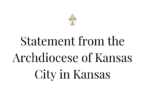
by Joe Bollig
joe.bollig@theleaven.org
KANSAS CITY, Kan. — For some people, the fruits of their labor are not represented by money in the bank, but by grain in the silo.
Farm families make their living from what they grow: corn, wheat, soybeans and other commodity crops. When harvested, the crops are stored until they are sold to a grain company.
In the past, if a Catholic farm family wanted to make a gift to a diocese, parish, school or other institution or ministry, they had to wait until they got the cash.
But not anymore. In May, the Archdiocese of Kansas City in Kansas launched a new giving program through the office of stewardship and development. The program — Gift of Grains — is a way for farm families to support the church through the gift of agricultural commodities.
The idea came about during the Block One phase of the “One Faith. One Family. One Future . . . in Christ” archdiocesan capital campaign. Most of the parishes in this block were located in small towns or rural areas. One family, Joe and Janice Bunck of St. Leo Parish in Horton, wondered if they could make gifts of their grain.
Joe Bunck, who happens to be on the board of the Catholic Foundation of Northeast Kansas, knew just who to ask about this: the office of stewardship and development.
“A farmer’s liquidity is in his grain,” said Bunck. “And because of changes in the tax laws, it’s an advantage to donate grain to a charitable organization.”
Farmers can still deduct the inputs (the costs associated with producing the crop) when filing their taxes. They can’t take a charitable deduction from the donated grain, but their taxes are reduced because they don’t declare income on the donated grain since they didn’t sell it.
“I have no record of it,” said Bunck. “It’s just gone.”
This was the kind of idea that resonated with Lesle Knop, executive director of the archdiocesan office of stewardship and development.
“The stewardship and development office consulted with our advisers and other dioceses in Kansas, Iowa, Nebraska and Missouri to see how they processed gifts of this kind,” said Knop.
Her office got a lot of help from the Archdiocese of Dubuque, Iowa, and the Archdiocese of Omaha, Nebraska.
But don’t look for Archbishop Joseph F. Naumann to be building grain silos next to his chancery office any time soon. The archdiocese never takes physical possession of the commodities. Rather, everything happens on paper.
Here’s how it works:
The farmer notifies the grain elevator that the harvest commodity being delivered or stored is to be given to the archdiocese. The elevator contacts the archdiocese, which will then sell the grain at market rate to the elevator. The elevator sends the check to the archdiocese. The donating farmer will receive a gift letter and acknowledgment from the office of Stewardship and Development.
Want to know more?
To learn more about Gift of Grains or to participate, go to the website at: archkck.org/graindonation, or call the office of stewardship and development at (913) 647-0325.






